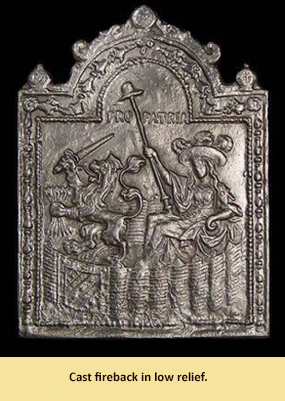Horne Point Fireback
March 2009
By Nichole Doub, MAC Lab Head Conservator
In 1976, excavations took place at the Horne site located on the south
bank of the Choptank River in Dorchester County, Maryland. Archaeologists
discovered a dwelling not previously on record, but found to belong
to a family of landed gentry, which occupied the area during the
late 17th and 18th centuries. The house burned around 1770 and was
never rebuilt, thus preserving the contents of the home in layers
of charcoal and plaster (Jull 1980). Among the artifacts recovered
from the site were a copper alloy tea set, thimbles and buttons,
glass and ceramic vessel fragments, iron keys and tools, and fragments
of a cast iron fireback.
Iron firebacks are a common historic feature in many homes across Europe
and North America. Traditionally, many fireplaces were constructed
of stone and mortar that can be easily damaged by the intense heat
generated by the burning of logs and peat. This is particularly
relevant to the masonry located at the rear of the fireplace, towards
which the greater portion of heat is directed. In order to preserve
the integrity of the fireplace, a fireback functions to reduce the
damage to the rear wall masonry by presenting a physical barrier.
Firebacks also have the added function of reflecting both light
and heat into the living area, thus maximizing the functionality
of the fireplace.
 Decorative themes on the firebacks from the 18th century tend to incorporate
coats of arms or allegorical stories. In the case of the Horne Point
fireback, the scene depicts the Maid of Dort (Dordrecht), the national
symbol for Holland, and the Lion of the Provinces sitting within
a palisade. The Maid holds a hat on the point of a spear while the
Lion holds a sword and seven arrows representing the seven Provinces
(Kammen 1996:93-94). This image symbolizes Holland, "surrounded
by her fortified frontiers, maintaining liberty by the force of
arms" (Churchill 1985:44). Both the sword and pomegranates along
the border (symbols of the unity of many under one authority) allude
to the struggle for unification of the Provinces (Westland London).
The scene is topped by the motto Pro Patria, 'for the fatherland'.
Dutch themes were not out of place in North America. After all,
New York City was a Dutch colony and called New Amsterdam until
1674. This motif is a legacy of the colonists' European heritage.
Decorative themes on the firebacks from the 18th century tend to incorporate
coats of arms or allegorical stories. In the case of the Horne Point
fireback, the scene depicts the Maid of Dort (Dordrecht), the national
symbol for Holland, and the Lion of the Provinces sitting within
a palisade. The Maid holds a hat on the point of a spear while the
Lion holds a sword and seven arrows representing the seven Provinces
(Kammen 1996:93-94). This image symbolizes Holland, "surrounded
by her fortified frontiers, maintaining liberty by the force of
arms" (Churchill 1985:44). Both the sword and pomegranates along
the border (symbols of the unity of many under one authority) allude
to the struggle for unification of the Provinces (Westland London).
The scene is topped by the motto Pro Patria, 'for the fatherland'.
Dutch themes were not out of place in North America. After all,
New York City was a Dutch colony and called New Amsterdam until
1674. This motif is a legacy of the colonists' European heritage.
The Horne Point iron fireback currently exists in a fragmented state
due to the intense heat experienced during the fiery destruction
of the home. Cast iron is a commonly chosen material for firebacks
for two reasons. First, the physical properties of iron, primarily
its comparatively high melting point, make it an ideal material
for withstanding the heat generated by a normal hearth fire. Secondly,
it can be melted and cast into a mold to produce attractive designs.
Unfortunately, some iron may contain defective qualities. Unlike
wrought iron, in which impurities are beaten out of the material
as it is worked, cast iron is dependent upon the smelting process
to remove impurities and contaminates. If these impurities are not
removed, the physical properties of the material can be affected
(Cronyn 1990:176). In the case of the Horne Point fireback, it appears
likely that excess sulfur was not removed before the artifact was
cast. Sulfur-rich iron will have sufficient strength when cold,
but cracks at red heat.
….it seems this fireback just couldn't take the heat.
| References |
|
| Churchill, W.A. |
| 1985 |
Watermarks in Paper in Holland, England, France etc., in the XVII and XVIII Centuries and Their Interconnection. 1935 authorized reprint, Amsterdam:DeGraaf. |
|
| Cronyn, J.M. |
| 1990 |
The Elements of Archaeological Conservation. London and New York: Routledge. |
|
| Jull, J. |
| 1980 |
"Preliminary Report of Excavations at Horne." The Archeolog Spring 1980, Vol. 32, No. 1. |
|
| Kammen, M.G. |
| 1996 |
Colonial New York. New York: Oxford University Press. |
|
| Westland London |
| 2009 |
Antique Firebacks. http://www.westlandlondon.com/stock/firegrates/firebacks/item/9449/image2.htm |
|